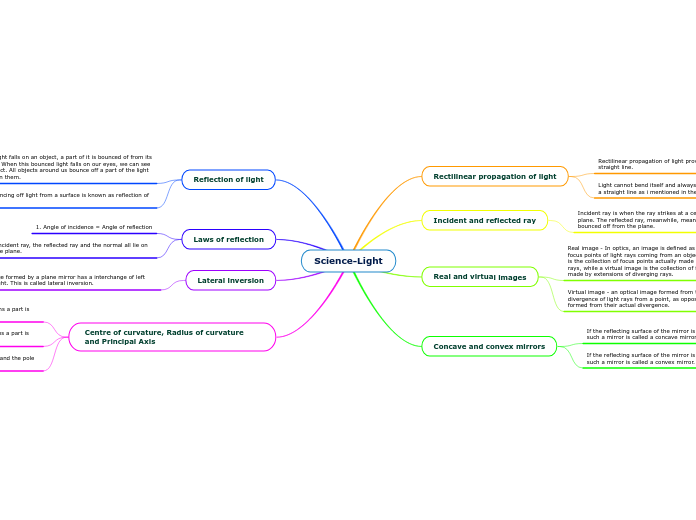Science-Light
Rectilinear propagation of light
Rectilinear propagation of light proves that light travels in a straight line.
Light cannot bend itself and always, in any situation, travels in a straight line as i mentioned in the first subtopic.
Incident and reflected ray
Incident ray is when the ray strikes at a certain point on the plane. The reflected ray, meanwhile, means that the ray is bounced off from the plane.
Real and virtual images
Real image - In optics, an image is defined as the collection of focus points of light rays coming from an object. A real image is the collection of focus points actually made by converging rays, while a virtual image is the collection of focus points made by extensions of diverging rays.
Virtual image - an optical image formed from the apparent divergence of light rays from a point, as opposed to an image formed from their actual divergence.
Concave and convex mirrors
If the reflecting surface of the mirror is curved inwards then such a mirror is called a concave mirror.
If the reflecting surface of the mirror is curved outwards then such a mirror is called a convex mirror.
Reflection of light
When light falls on an object, a part of it is bounced of from its surface. When this bounced light falls on our eyes, we can see the object. All objects around us bounce off a part of the light falling on them.
The bouncing off light from a surface is known as reflection of light.
Laws of reflection
1. Angle of incidence = Angle of reflection
2. The incident ray, the reflected ray and the normal all lie on the same plane.
Lateral inversion
A image formed by a plane mirror has a interchange of left and right. This is called lateral inversion.
Centre of curvature, Radius of curvature and Principal Axis
The centre of the sphere of which the mirror forms a part is called the centre of curvature.
The radius of the sphere of which the mirror forms a part is called the radius of curvature.
The line passing through the centre of curvature and the pole is called the principal axis.
